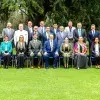Trends, challenges, and opportunities in the current world of education were the topics discussed at the ninth annual International Conference on Educational Innovation (CIIE 2023).
This conference, organized by the Institute for the Future of Education at Tec de Monterrey, was held from January 16 to 18 on Monterrey campus.
CIIE offered keynote talks and panels, exhibitions, networking sessions, and other events aimed at teachers, academics, graduates, and the general public.
“CIIE has become a very important international conference for advancing efforts to transform higher education and lifelong learning,” said Michael Fung, Executive Director of the Institute for the Future of Education.
Here are some of the topics of note at the conference:
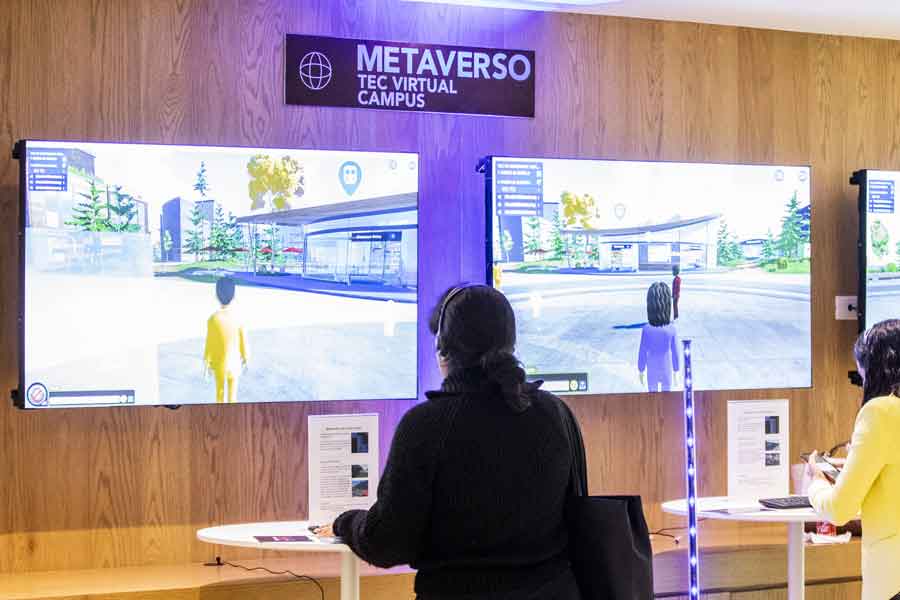
Lifelong learning
During the inaugural address, Michael Fung shared 5 paradigm shifts for revolutionizing the education of the future.
“Certain capacities and skills of our workforce are becoming obsolete and need to be renewed for people to continue to be employable and for companies to be competitive,” said Fung.
These paradigm shifts are required to transform continuing education in the future and how people will acquire and strengthen the skills they need for the labor market.
The Tec director invited attendees to take action to shift the paradigm toward mixed learning models based on work and lifelong learning through multiple modular tracks, in which there is collaboration with companies on syllabuses, as well as between public and private institutions.
To this end, he proposed the key themes for the future of education, which can be summarized as FAIR: Fit-for-purpose, Accessible, Inclusive, and Relevant and responsible.
“People must be prepared to go through many different phases of life and acquire experience of different kinds of jobs and career paths,” he said.
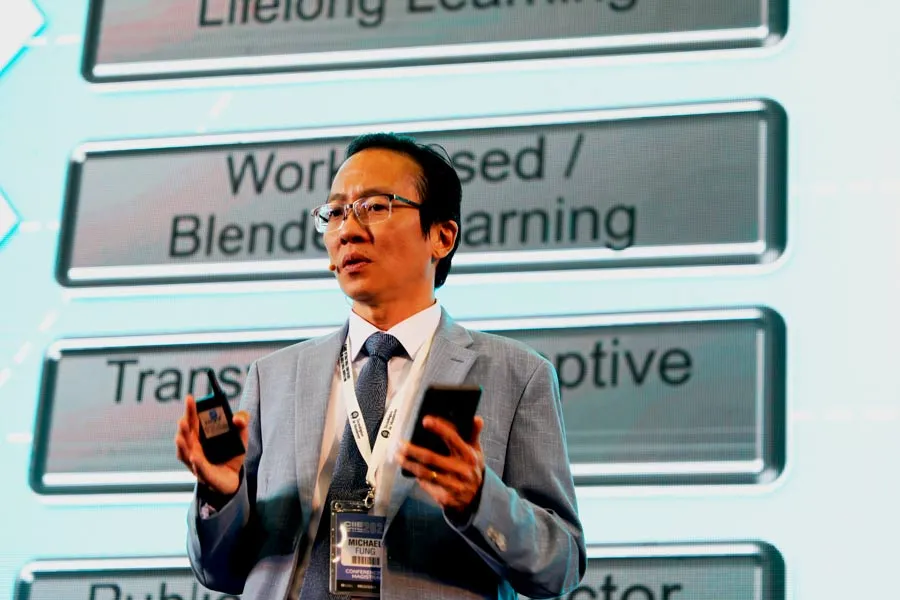
Adapting to exponential change at work in the 21st century
During the pandemic, the evolution of work took a different course. Gary Bolles, a specialist in digital disruption and the future of work, called this the “great reset.”
“We went through a complete reconfiguration almost overnight. The rules of employment changed and, if there’s any way flexible work is going to be successful, our mindset must change, too,” he said.
Bolles has identified 3 factors for adapting to exponential change:
- Maintaining a growth mindset.
- Developing a skill set for problem solving, adaptation, creativity, and empathy.
- Acquiring a tool set of techniques and technology for solving tomorrow’s problems.
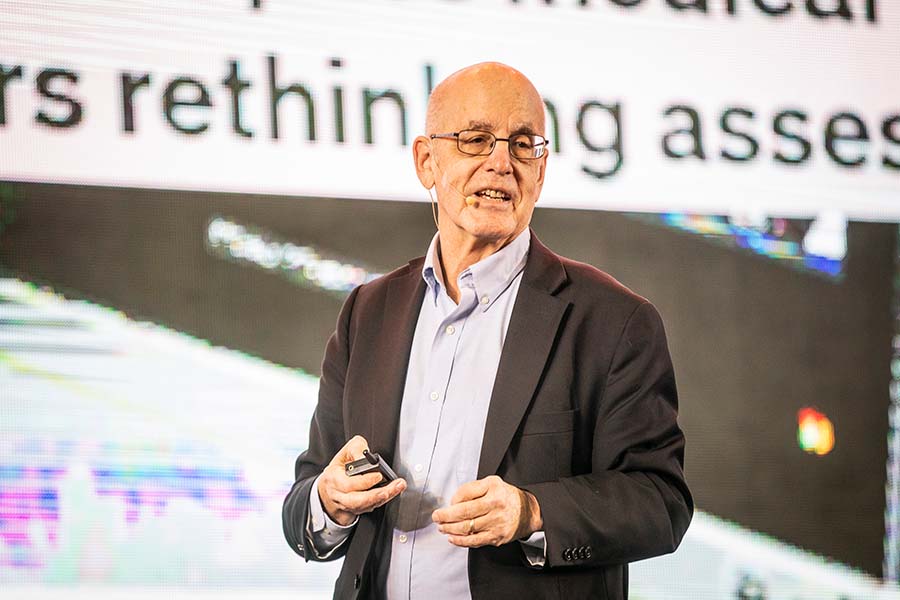
Projects rewarded for responding to educational challenges
CIIE 2023 saw the announcement of the winners of the TPrize, an open innovation initiative from Tec de Monterrey and the University of Los Andes that seeks to encourage solutions to the educational challenges of Latin America and the Caribbean.
5 projects were this year’s winners:
Swarmob (Chile): a web platform for learning management that encourages contributions to sustainable development.
Skalo (Colombia): a software program to customize the education of academically vulnerable students who face barriers to learning.
Wonderly (Venezuela): a program to help elementary and middle school students learn to code with content in three languages.
Kimple (Argentina): a teaching platform that offers learning experiences based on social and working context.
1Mentor (Ecuador): artificial intelligence programmed so that learning is at the level of future jobs.
RIE 360 Award for Educational Innovation
CIIE included the ceremony of the RIE 360 Award for Educational Innovation. 3 projects were recognized this year.
“The aim of this award is to give professors recognition for educational innovation and encourage more contributions. It also helps to publicize best practices to inspire other professors,” said José Escamilla, Associate Director of the Institute for the Future of Education.
First place: María Elena Sánchez Vergara (Universidad Anáhuac México)
Sánchez designed a semester project in which students developed functional prototypes based on recycled materials with the assistance of GRANTA, a software program for materials engineering.
Second place: Josefina Castillo Reyna (Tec de Monterrey)
Castillo developed Virtual Journey, a 360° video tour that is an interactive virtual journey in 3D through a bacterial infection.
“The initiative allows students to improve their learning because they use all their senses, interact, and make decisions in the virtual experience,” she said.
Third place: Jorge Guillermo Ibáñez (Universidad Iberoamericana in Mexico City)
Ibáñez created small individual laboratories for doing chemistry experiments.
RIE 360 is a network consisting of 9 public and private universities in Mexico, which includes Tec de Monterrey.
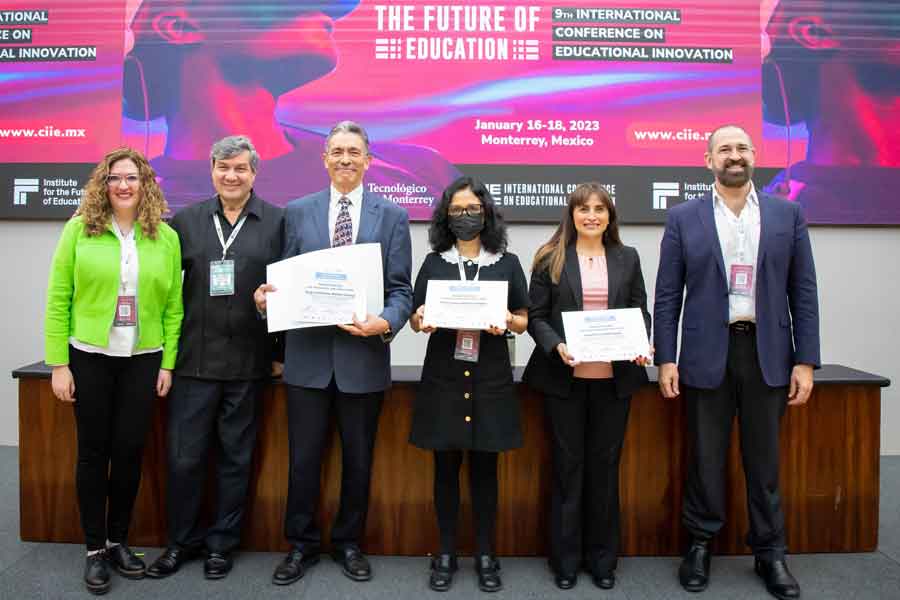
Democratizing international experiences without leaving the country
Rhonda Lenton, President and Vice-Chancellor of York University, shared her vision for online internationalization: universities must continue developing a culture of flexibility.
Lenton took part in the fireside chat “Sharing a Vision for Online Internationalization.”
“Online internationalization has advantages over an international experience for those who have difficulty in leaving home and going to another country. For example, 16% of students at our university work part-time to pay for their studies,” she said.
CIIE 2023 also recognized Tec de Monterrey’s Global Shared Learning initiative, which fosters collaboration between students, professors, and international universities in a digital environment.
The program’s Week format is part of the Tec Week courses for Tec21 Educational Model students that strengthens the value of a global vision while generating an “at home” internationalization experience with significant learning.
La Tríada and its vision for education in Latin America
Rectors from La Tríada, the alliance of Tec de Monterrey, the University of Los Andes in Colombia, and the Pontifical Catholic University of Chile, discussed their vision for education in the region.
“We have created a culture of educational innovation, in which the community at large sees a great opportunity combined with a responsibility and obligation to continue innovating and surpassing what has been achieved in the past,” said Juan Pablo Murra, Rector for Higher Education at Tec de Monterrey.
This practice is strongly connected to the use of technology and technological trends, he said.
The rectors concluded that there must be shared leadership to address different aspects such as general education, updating curriculums, teaching innovation, and placing students at the heart of everything.
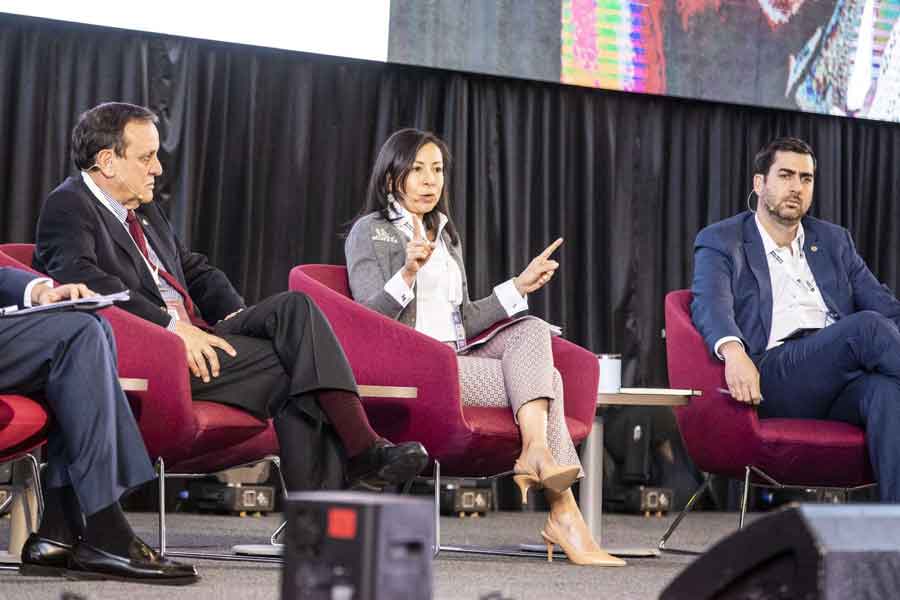
6 educational trends implemented by Tec de Monterrey
Juan Pablo Murra, Rector for Higher Education at Tec de Monterrey, shared 6 educational trends that the institution is implementing:
- Lifelong learning
- Disruptive technologies
- Digital and hybrid education
- Global education
- Learning based on competencies and challenges
- Mental health for development
Making technology an ally of education
Technology is a fundamental tool for educational innovation, said education specialists during the Times Higher Education keynote panel How can we Promote Innovation in Higher Education?
The panel included Amadeo Sosa, Academic Director of Universidad Tecnológica (UTEC), and Stephen Harmon, a professor and Interim Executive Director of the Center for 21st Century Universities.
This panel was moderated by Miranda Prynne of Times Higher Education (THE) Campus, who said that the COVID-19 pandemic had brought challenges for higher education.
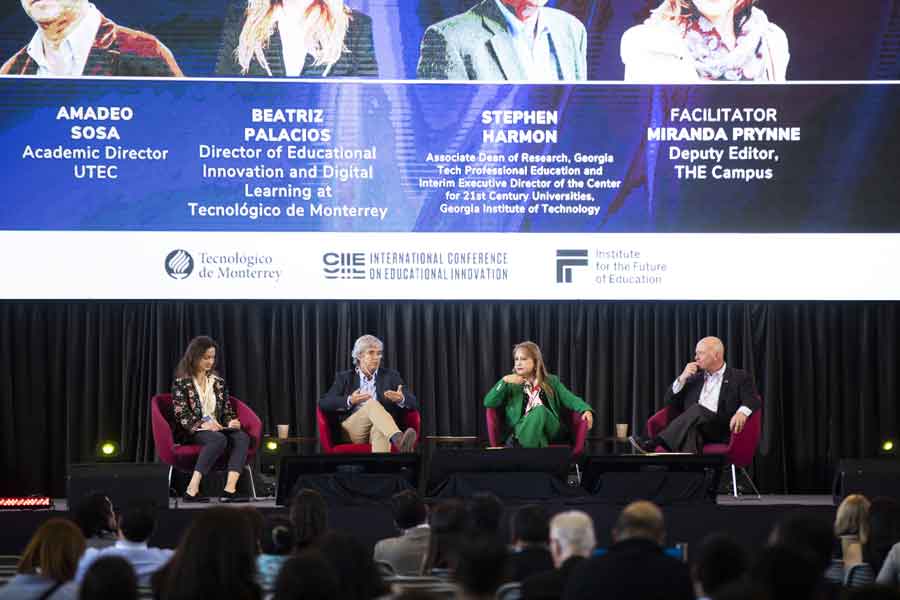
More topics seen at CIIE 2023
- STEM education in Latin America
Nina Smidt, Director and Spokesperson of the Board of Siemens Stiftung, gave a talk entitled STEM Education and Citizenship: LATAM STEM Network, United toward a Common Goal.
In this keynote speech, Smidt stressed the importance of education in Science, Technology, Engineering, and Mathematics (STEM) in Latin America.
- Innovation in continuing education
Stephen W. Harmon, professor and Interim Executive Director of the Center for 21st Century Universities, gave a talk entitled Innovation for Access to Lifelong Learning: A Changing Role in Higher Education.
“The number of technological advances in 2013 happened every 20 seconds during 2020,” said Harmon.
In another talk, Professor Pey Kin Leong spoke about Cyber-Physical Learning.
- The most promising EdTech startups in Latin America
Taking part in this panel were Lissy M Giacomán Colyer, Co-founder and CEO of Vinco; Julián David Melo, CEO of Ubits; and Juanita Ordóñez, Co-founder and Growth of PROtalento. Patrick Brothers, Co-CEO of Global Impact Intelligence Platform HolonIQ, was the moderator.
The panelists discussed the challenges of finding investors for educational topics and listed the key components of success for an educational startup.
- Exponential changes in universities
Cheryl Regehr, Vice-President and Provost for the University of Toronto, and Vincent Del Casino, Provost and Senior Vice President at San José State University in California, discussed what educational institutions need to do to respond quickly to a changing panorama.
“We should look for ways to mix the curriculum with the needs of the industry. We can offer educational opportunities to other types of people; we just have to be flexible,” said the Vice-President for the University of Toronto.
“Universities invest a lot in technology, but there’s a lack of investment in teachers, managing the technology they have, and the support that is accessible to faculty and staff,” stressed Del Casino.
- Child development: basis of prosperous communities
“The first years of childhood are decisive for human flourishing and thus for prosperous societies,” said Pat Levitt, Director, Vice President, and Chief Scientific Officer at the Saban Research Institute of the Children’s Hospital Los Angeles.
In his chat with Dr. Guillermo Torre, Rector of TecSalud, he discussed the importance of early childhood in the full development of people and societies.
- Educational systems must be relevant flexible, and sustainable
“in Latin America, only 46 percent of those who start college complete a university degree,” shared Francesc Pedró, Director of the UNESCO International Institute for Higher Education.
“(That figure reveals) a problem with the importance of what we’re doing, but also in the way we provide education,” said the specialist.
Also participating were Gonzalo Baroni, National Director of Education at the Uruguay Ministry of Education and Culture, and Elena Arias.
About CIIE 2023
The International Conference on Educational Innovation (CIIE), organized by Tec de Monterrey’s Institute for the Future of Education, is a space for sharing the trends and practices that are revolutionizing the world of education.
Since 2006, it has helped innovative people to improve education, making an impact on about 2 million people in 40 countries.
During the inauguration of CIIE 2023, it was announced that its name will change next year to: IFE Conference 2024.
READ ALSO:



